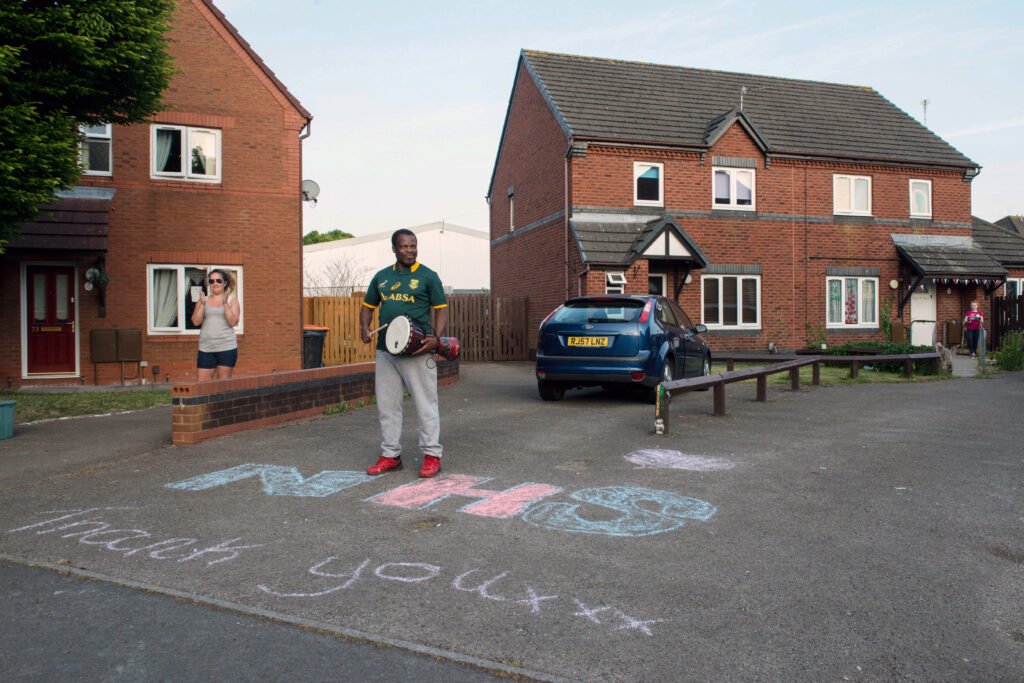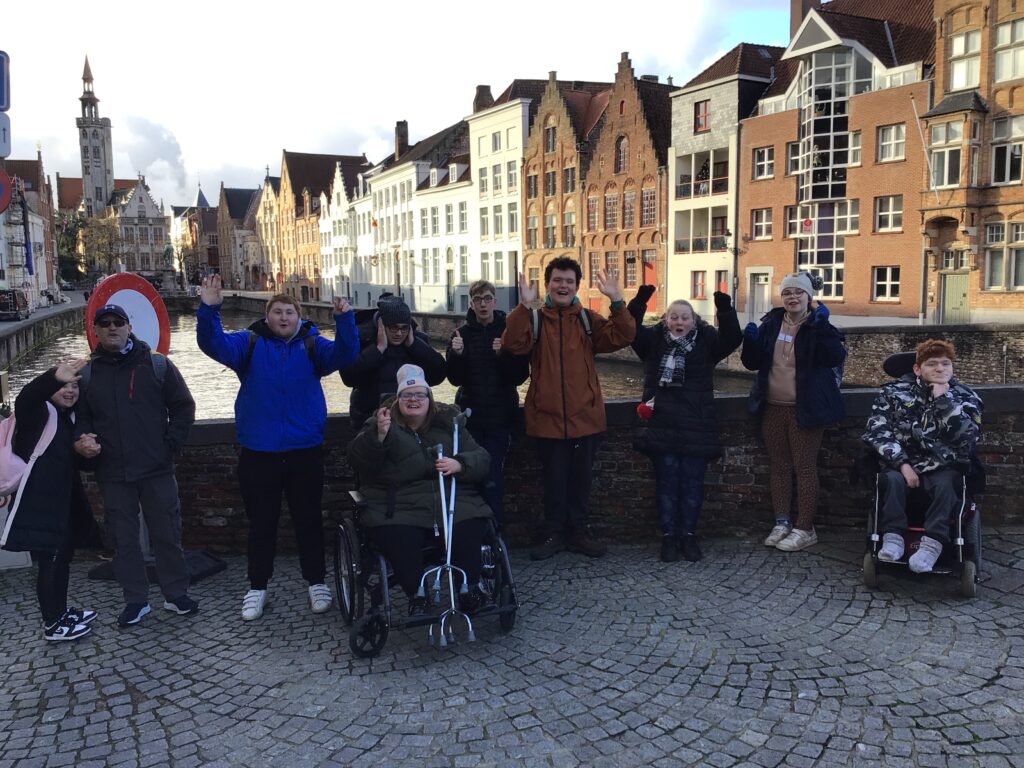Robert Muza talks to Dylan Moore about inspiring young people and connecting communities – from Mufakose, Zimbabwe to Newport, Wales
When life has proved as tempestuous as it has for Robert Muza, it must be tempting to look for patterns.
The man who now describes himself as a ‘global youth worker’ finds symmetry in the fact that the population of Newport, south Wales, where he has now been resident and active among the city’s Black, Asian and minority ethnic communities for nearly twenty years is similar to that of Mufakose, the suburb of Harare where his life began.
Muza’s attempt to describe Mufakose is indicative of the degree to which he is now also a Newportonian and global citizen. He calls it ‘a ghetto, like those found in American cities’ before comparing it to Newport’s outlying districts of Bettws and Ringland, ‘only its population is the same as the whole of Newport.’
Further detail, however, reveals that comparison with Welsh council estates is still some way from capturing its essence. Being from Mufakose, Musa explains, gives a young person just three choices. ‘One is academic – if you decide to study very hard, that is one route.’ But he implies this is a road less travelled, and that the main possibilities to choose between are a life of crime – he lists ‘drug dealing and car jacking’ by way of example – or an escape through sport.
Fortunately for his own start in life, he attended what he describes as a ‘Grade A school’, that had, under the previous apartheid system, been a whites only institution. In Muza’s youth in the 1970s and 80s – when the former British colony of Rhodesia became the modern nation state of Zimbabwe, and its capital Salisbury had its name changed to Harare – such schools became multiracial, and allowed him, as a black boy, opportunities that did not exist for previous generations.
‘I had Indian friends, white friends, black friends,’ he says of his schoolmates, before explaining how sport, particularly hockey and chess, became his tickets to the world beyond Mufakose.
‘There was a movement to make sure sports like hockey, rugby and cricket created opportunities for black players.’
Muza played hockey for the Eradicators, the first and only black hockey club in Africa, under the tutelage of Custom Kachambwa, whom he describes as his own role model. He was helped by the quota system, made globally famous by the success of the South African rugby team, but which Zimbabwe was the first to introduce.
‘There was a movement to make sure sports like hockey, rugby and cricket created opportunities for black players.’ Muza admits to being a ‘big fan’ of the system that gave him his break, and opportunities to travel domestically, and in 1988 to an international tournament in Malawi.
But Muza didn’t use the opportunities he was afforded as a springboard to leave his community behind. On the contrary, he used the connections he made to pull others up, a trait that has continued throughout his half century of life.
In Mufakose, his status as a ‘community connector’ (a description that is now his job title with Newport City Council) centred on his ability to use his contacts to create employment opportunities. ‘I would talk to my school friends, and ask them to talk to their dads about what jobs were available, to find employment for my friends and young people in Mufakose’.
In Newport, Muza has similarly created opportunities for youngsters – particularly local youths from Black, Asian and minority ethnic communities – through sport. For twelve years he ran a Futsal club in Newport leisure centre, with 75 young people in attendance every Tuesday and Thursday. He also ran a football club – Newport Warriors FC, who competed in the Newport and District League, and was invited to FIFA headquarters in Switzerland to present his sporting work with young migrants to football coaches across Europe.
Discussions and debates that drive Wales forward.
Join Wales’ leading independent think tank.
But Muza’s community efforts have not been limited to sport. During the pandemic, he has used his role as one of Newport City Council’s three BAME community connectors to set up a specific food bank for people from African backgrounds. He was already involved in supporting thirty African families to access local food banks, but noted that generic British foodstuffs handed out did not provide the ingredients needed to allow families to make their own staple foods.
Muza used his connections with African and Asian grocery stores across Newport to deliver fifteen culturally appropriate food hampers each week, with contents covering every region of Africa.
Muza’s activity within his local community is mirrored by continuing work linked to Mufakose. With help from Welsh Government’s Hub Cymru Africa programme, he has expanded a project to feed 650 families in the Harare suburb through food hampers and breakfast clubs, explaining that lockdown measures in many African countries have disproportionately affected communities already suffering severe food poverty.
After almost twenty years in Wales, Robert Muza has become the go-to guy for Newport’s African communities. He estimates that the city is home to 600 Zimbabwean families, many of whom arrived to work as radiographers and nurses in the city’s two main hospitals.
But his networks stretch far beyond those linked to his homeland. He talks about the 213 WhatsApp groups he is part of. ‘Sometimes, for example, I will be seeing a conversation in the Senegal-Gambia group, and they will all be talking their own language, and I don’t understand anything, and then someone will tag me and write something in English, and that’s when I know I’m wanted,’ he laughs.
Whatever the issue or problem, Muza is willing to step in and help out, with information, help applying for grants, or whatever it takes to allow other community leaders to build their groups’ capacity.
But how did he end up in Wales? As a young man with strong networks among both ends of the social spectrum in Harare and a good job, as a transport controller in the landlocked country’s crucial road haulage industry, why did he need to flee the country? The answer lies, once again, in Muza’s seeming inability to stand by while others suffer. ‘Zimbabwe used to be rosy,’ he explains, ‘at the time when I was growing up. You could get whatever you liked. But things started going bad, especially with human rights.’
He recounts a story of corruption and the infamous farm invasions. ‘The GDP of Zimbabwe all comes from agriculture and mining, so when the government seized the farms from the white farmers, we started to see prices go up, and the country began importing things like maize for the first time.’
But the economic turbulence in Zimbabwe did not affect Muza via reading the newspaper; he saw the fallout from the disastrous policies with his own eyes. ‘I learned it through experience,’ he says, ‘through the things I saw around me. I travelled, playing hockey. We used to play in a nationwide league, and as you travelled, you could see poverty, you could see corruption, you could see police brutality.’
Muza was ideally positioned to see for himself the economic downturn caused by the aftermath of the farm invasions. As well as his travel with the hockey club, his job as a transport controller meant he was used to hundreds of trucks leaving for ports in South Africa and Mozambique loaded with produce from the country’s rich agricultural base.
‘When they couldn’t find you, they would harm the people you love. Myself, I had lots of places to go and hide; I could go to another town, but I couldn’t take all of my friends with me.’
But suddenly cotton and tobacco exports dried up, and unemployment became the norm. Always one to act in the interests of the affected, Muza became more heavily involved in trade unionism, with the Zimbabwe Congress of Trade Unions (ZCTU), the labour movement which was to become a spearhead for resistance to President Robert Mugabe’s one-party state.
The result of Muza’s raised head above the parapet was as brutal as it was predictable. As his activism increased – organising stay-aways, strikes and boycotts aimed at alleviating the plight of the country’s increasingly exploited workforce – so did police harassment. Often, Muza was able to use his extensive networks to escape direct persecution, hiding out with friends in other neighbourhoods or outside the city.
But soon the authorities turned up the heat. ‘When they couldn’t find you, they would harm the people you love. Myself, I had lots of places to go and hide; I could go to another town, but I couldn’t take all of my friends with me.’ On top of the guilt at feeling responsible for the violence suffered by his allies, Muza had his family to think about.
When he first arrived in Newport – where he had friends who had already fled Zimbabwe – Muza was separated from his then wife and two young daughters. Touching down at Heathrow on a flight via Cairo in 2001, Muza remembers that after 9/11, ‘the whole world was in a panic, and I was in a panic.’
Claiming asylum as soon as he arrived in the UK, Muza was not prepared for the ordeal that was to follow. ‘I wasn’t prepared for questioning. I just wanted to rest, and think about the next move for my family.’ But he was to discover that despite the clear persecution he had suffered, his privileges counted against him. ‘They could not buy my story because of my status. How could I have played hockey for Zimbabwe, and have a good job, and manage to buy the air ticket when others were arriving in lorries and on boats?’
It was to be eight years, and a whole other story, before Muza would be granted leave to remain in the country he would eventually call home. But it was to be these long years ‘living in limbo’ that were to lay the foundations for the success of his new life as a global activist.
Like many asylum seekers, Musa used much of his time volunteering for a variety of community organisations, initially as a youth mentor with BAWSO in 2004, where he discovered what was missing in the lives of many young people from migrant and ethnic minority backgrounds. ‘They often needed a father figure, and a social life. It was through this that I began the sports activities, initially just as a kickaround in the local parks.’
A year after Muza’s arrival, and despite the initial refusal that met his asylum application for asylum, his wife was able to join him in the UK on a student visa, bringing their two young daughters and reuniting the family – albeit in strained circumstances – in Newport. His wife studied, worked, and looked after the family, while Robert did his best to keep himself occupied with volunteering, his only legal recourse to continuing his natural inclination toward active citizenship.
But as the girls grew into teenagers, and began to want to fit in with their peers, pressure grew within the family for Muza to become economically active. A series of ironic twists in the tale provided the breakthrough he had sought since day one. It started with Muza’s elder daughter came home with a letter from St Joseph’s High School with details of the annual trip to France. ‘She came home very happy, saying We’re going to France!’
Innovative. Informed. Independent.
Your support can help us make Wales better.
There were two big problems with allowing his daughter to participate in the visit. ‘First of all, I didn’t have the two hundred and fifty pounds that the trip would cost, and second, our immigration status meant we did not have passports. If she left the country, she would not be allowed back in.’
Until the mention of this trip, there had been no need for Muza to burden his daughters, not yet in their teens, with the weight of the problem that had followed the family from Zimbabwe to Wales. They were blissfully unaware of their father’s official status as a ‘failed asylum seeker’, and their mother’s precarious position as a temporary student resident of the country. Muza agonised about the situation, steeling himself to reveal to his daughters the true nature of the family’s plight.
Given three years’ leave to remain, then another three, before finally being granted indefinite leave to remain in the United Kingdom in 2015, Muza is now applying for a British passport.
But fate intervened, for good and ill. First, the father of his daughter’s friend – thinking it was simply a financial issue – kindly paid for her trip to France; this led to Muza having to explain his predicament to the headteacher. After writing to the Home Office for special dispensation, which was refused, he spent a whole day with the girl, letting her down gently. But the disappointment of the school trip became the catalyst for a series of events that led to Muza’s salvation.
By this time the youth worker was a well-known and well-respected figure across Newport. When his case for working illegally went to court, he was able to present 47 letters of commendation from local organisations, businesses, and community leaders, praising him for his good citizenship. Despite ironically sentencing him to 300 hours community service, the judge was also to write a 48th letter – to the Home Office – and in so doing tipped the scales in favour of the man from Mufakose. Given three years’ leave to remain, then another three, before finally being granted indefinite leave to remain in the United Kingdom in 2015, Muza is now applying for a British passport.
‘Global Youth Worker’ is an apt description. Muza does not only works in a global and post-colonial context that results in Wales’ third city having significant and growing communities from around the world, he is also determined to tap the experience and resources of those who have left Mufakose and now live all over the world. Many of his WhatsApp groups are linked to the Mufakose Diaspora Network, people now living in the UK, USA and South Africa, who are still working to improve the lives of those who still live in what remains a difficult place to grow up by donating a minimum of £10 a month.
Now with a changed political climate back home, he is able to return to Zimbabwe. When Muza visits his home neighbourhood he is proud to note four chess tables outside. These are just one aspect of his legacy in the ghetto, although the young people who use them now are unaware of their provenance.
‘To some young people there now I’m a stranger, but when I’m there I explain to them they are playing on my chess tables!’ It’s a fitting symbol for Robert Muza’s work, constantly helping people get a leg up onto their own ladders, assisting those who may not always have the opportunity to travel upward or outward, facilitating the choice of sport or academia over crime, and not necessarily being around to see the full fruits of his labour.
All this week the welsh agenda online will be showcasing work from our partnership with Africa Welsh News.
All articles published on the welsh agenda are subject to IWA’s disclaimer.





